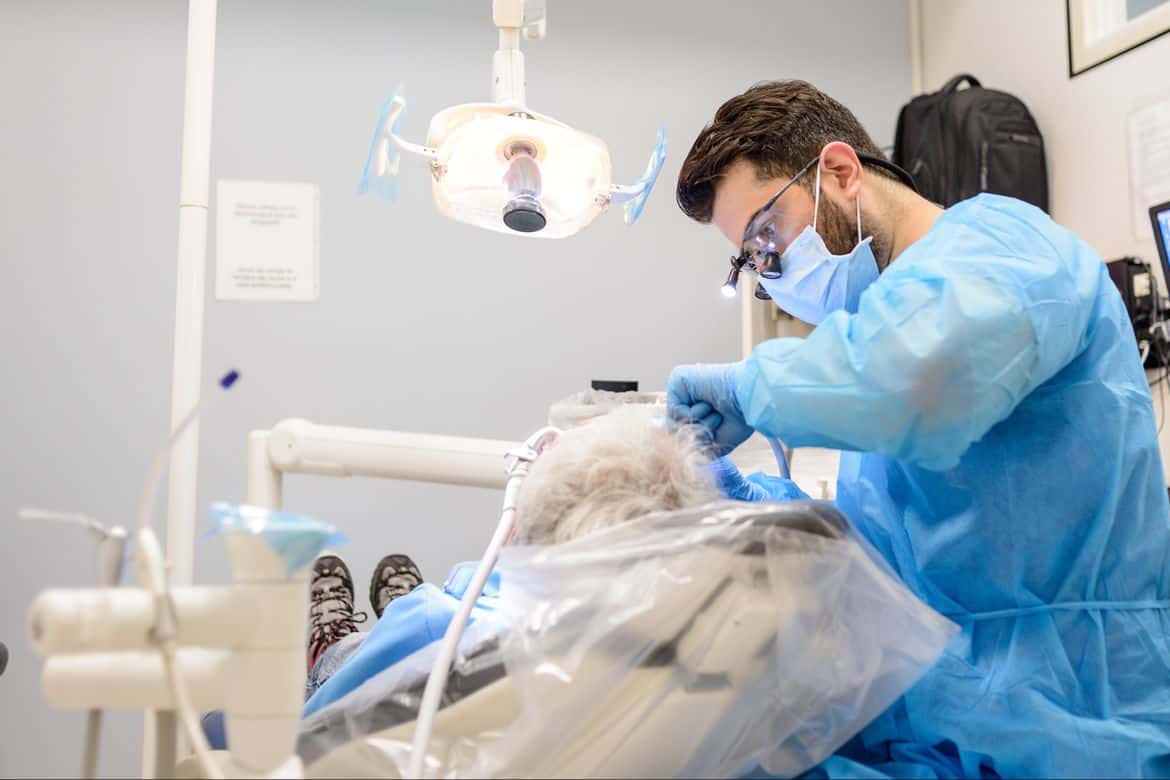 $1.67 million gift from the Delta Dental Community Care Foundation will establish the UCLA Dentistry MINDFUL Project
$1.67 million gift from the Delta Dental Community Care Foundation will establish the UCLA Dentistry MINDFUL Project
The UCLA School of Dentistry will increase access to comprehensive oral health care among geriatric and special needs populations through a new program made possible by the support of the Delta Dental Community Care Foundation’s largest-ever single gift to a dental school. The Community Care Foundation is the philanthropic arm of Delta Dental of California.
With $1.67 million in funding to UCLA Dentistry’s Community-Based Clinical Education Program, the dental school will create the UCLA Dentistry MINDFUL Project, which stands for mobile care in dentistry for underserved populations living in long-term care facilities. The project has three primary objectives:
- Increase the number of proficient oral health providers for target populations
- Increase oral health literacy for target populations and caregivers
- Increase research into the barriers that impact access to care
More than two-thirds of adults in the U.S. aged 65 and older have experienced periodontal disease and nearly 40% of nursing home residents have no teeth, underscoring a critical need to deliver adequate oral health care to the country’s growing geriatric population. Meanwhile, special needs populations often face wait times of longer than a year for appointments with dental clinicians trained in the complex health conditions they experience.
A main barrier to achieving good oral and overall health for these populations is the high demand and insufficient supply of providers who are willing and able to deliver comprehensive care.
“Our goal over the next three years is to establish and fine tune a self-sustaining program that will provide an additional workforce for communities in need,” said Dr. Lisa Nguyen, program director of MINDFUL and associate director for the community-based clinical education program. “We strive to enhance our students’ confidence in treating these target populations and increase the likelihood that they will continue to serve geriatric and special needs populations after graduation. We are so grateful for Delta Dental’s philanthropic support of this program.”
Nguyen noted the MINDFUL Project will enable trainees to provide oral health services in a non-traditional practice setting, an opportunity most dental students across the nation might not have. Among the dental school’s 2021 graduates who participated in community-based clinical education rotations, 22% reported plans to work in public health, compared to a national average of 10% for fourth-year dental students. Nguyen is optimistic to see a similar increase in graduates working with older and special needs populations.
Serving long-term care facility residents aligns with one of Delta Dental’s top priorities, ensuring oral health care for older adults.
“We know through our decades of experience in the oral health care sector that older adults struggle with oral health problems and lack the support they need for proper dental care,” said Kenzie Ferguson, vice president of foundation and corporate social responsibility for Delta Dental of California. “UCLA Dentistry’s MINDFUL Project will play an integral role in helping to address the oral health care shortfalls seniors experience. The project is fundamental to delivering on Delta Dental’s goals of promoting the connection between oral health and overall health, providing quality outcomes, improving access and creating greater equity in the treatment older adults receive.”
Through the MINDFUL Project, the dental school will establish new partnerships with community organizations throughout Southern California that deliver dental care utilizing mobile equipment. The school will also bring together dental, nursing and long-term care facility staff members to collaborate to improve processes and outcomes. This includes implementing the California Department of Public Health’s oral health toolkit and producing interactive videos.
“Through the community-based clinical education program and the generous support of Delta Dental, our students have significantly broadened their experiences caring for some of the most vulnerable patients in California,” said Dr. Paul Krebsbach, dean of the UCLA School of Dentistry, which established the community-based clinical education program in 2018 thanks to a $1.5M Delta Dental grant. “The MINDFUL Project is a natural and vital extension of this partnership, aiming to enact lasting oral health change among long-term care facility residents.”
Using the cost offset model developed under Associate Dean Bill Piskorowski for the community-based clinical education program, MINDFUL is designed to be self-supporting, covering staff salaries, necessary technology and student travel expenses. The MINDFUL Project will also assist community clinics and organizations offering oral health services for geriatric and special needs populations to improve operations efficiency, provide continuing education and serve as a pipeline and opportunity for graduates to work in public health settings.
While an estimated 6,500 patients will be cared for over MINDFUL’s three-year funding lifecycle, the project’s ultimate goal is to develop a sustainable and ever-growing pathway to significantly increase the number of competent oral healthcare providers willing to deliver care for older adult and special patient populations in any setting through education, clinical experience and dissemination of research and knowledge.
“Through this project, we gain the unique opportunity to learn and share much-needed research to better understand the relationship between oral health and well-being, in addition to barriers to care, to improve care delivery for older and special needs populations, particularly in non-traditional dental service delivery settings such as long-term care facilities,” Nguyen said.
Stay Relevant With Implant Practice US
Join our email list for CE courses and webinars, articles and mores



